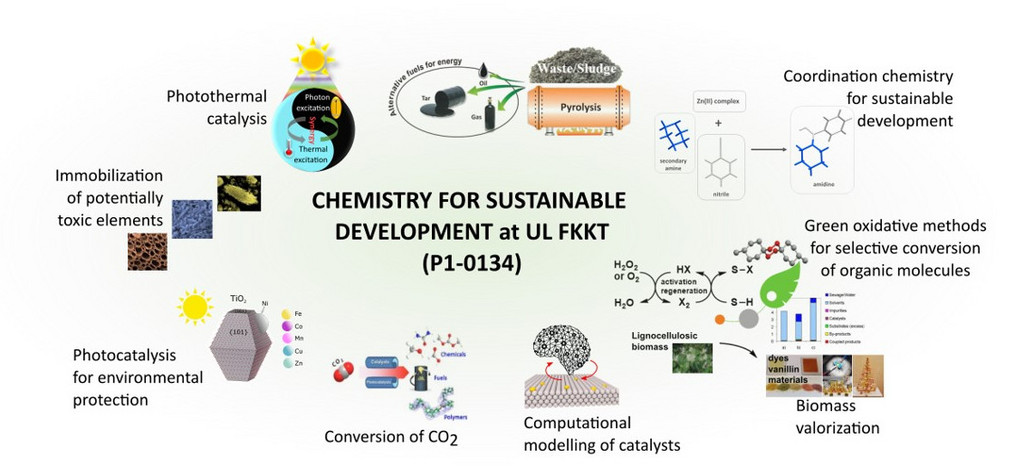Chemistry for Sustainable Development
P1-0134
Duration: 1.1.2022 - 31.12.2027
Head:
prof. dr.
Lavrenčič Štangar Urška

In the research program "Chemistry for Sustainable Development", we study materials and processes that are key to sustainable development, using the combined expertise of inorganic and organic chemists who participate in the program and come from two institutions (University of Ljubljana, Faculty of Chemistry and Chemical Technology, and Jožef Stefan Institute). At UL FKKT, we carry out the following activities.
1. Photocatalysis for environmental protection
One of the main objectives is the development, manufacture and testing of modular photocatalytic reactors for water purification, the operation of which can be adapted to the amount of pollutants in the water and the required cleaning speed, and their evaluation in terms of efficiency and economic viability.
2. Catalytic conversions of carbon dioxide
We are exploring ways to convert CO2 into useful chemicals. For this purpose, catalysts based on CeO2 and ZrO2 are prepared. We will also focus on kinetic studies, which have been neglected in previous research.
3. Photothermal catalysis
The dual mode of excitation, both photonic and thermal, in one-pot processes makes it possible to overcome the Arrhenius-type activation energy barrier in catalytic reactions. We will develop photothermal catalysts by studying the combination of non-plasmonic and plasmonic metallic carbon composites.
4. Computer modeling of catalysts
We explore a holistic machine learning framework for rapid screening of heterogeneous catalysts using descriptor kinetic analysis. In this way, we will be able to predict the properties of new catalysts, thus accelerating their development and the selection of efficient synthesis routes.
5. Green oxidative processes for selective conversion of organic molecules
We develop methods for the selective conversion of organic molecules using green oxidants. We evaluate their environmental potential and explore the use of alternative solvents and solid supports. New cyclic peroxides that are biologically active are synthesized (having antibacterial, antiviral, antitumor, antifungal properties and impact on plant development).
6. Biomass valorization
We investigate the conversion of lignocellulose into useful chemicals and materials. Lignin conversion to aromatic molecules with green oxidants, the conversion of cellulose into hydrogels using natural aliphatic dicarboxylic acids and lignin derivatives are investigated, and emodin dyes are modified in order to improve their biological and photochemical activity.
7. Immobilization of potentially toxic elements
We study the bioavailability of PTE in various environmental dust samples (house dust, road dust) and the adsorption of PTE directly to biochar. Despite a lot of research, the actual role of biochar in stabilizing PTE is still largely unexplained. With the preparation of LDH in the form of thin layers, we want to combine an adsorbent and a photocatalyst that simulates the day-night rhythm in nature.
8. Coordination chemistry in sustainable development
We investigate the coordination chemistry of molybdenum in higher oxidation states, zinc(II) and copper(II) with the aim of determining and optimizing the reaction conditions to undertake the chemical conversion of ligands. In the case of new curcumin complexes, we focus on their synthesis, characterization and antiviral efficacy.
9. Innovative techniques for industrial sludge management
We are focusing on the development of a sustainable solution to improve the sludge dewatering capability and on exploring the possibility of effective disposal of the resulting sludge by its further use as a raw material for the pyrolysis process, in order to obtain energy.
The research programme follows the priorities, that are defined in Horizon Europe 2021-2027 strategy, the current framework programme of European community. Sustainable development is still an integral objective of the vision of the EU programme on investing in research and innovation. Excellent science and innovation are key factors that help Europe to move towards smart, sustainable, inclusive growth, and along the way to tackle its pressing societal challenges. Following priorities of the European Commission, our programme is focused on secure, clean and efficient energy, green chemistry and technology, and sustainable approach to management of the environment. Part of our research includes also in the "fit for the digital age" priority. We will continue to follow the excellence in research with a strong tendency toward innovation and industrial co-operation. It is the way we jointly create European science excellence and contribute to industrial innovation of our regional economy.